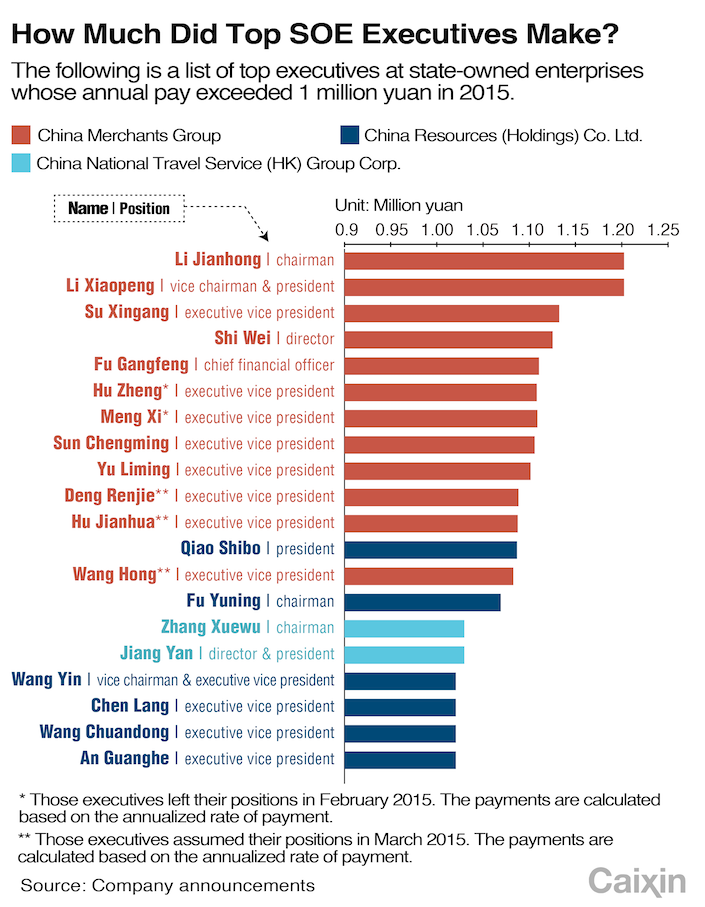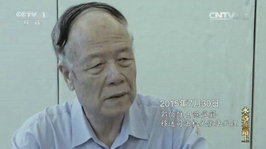Bosses of Big Chinese SOEs Paid Less in 2015 after Salary Cut Order
(Beijing) — The average pay of top executives at big Chinese state-owned enterprises (SOEs) declined in 2015, after Beijing’s policy to cut their salaries took effect at the start of the year, figures from the companies show.
All 111 SOEs overseen by the State-Owned Assets Supervision and Administration Commission (SASAC) in 2015 had published the pay of their senior managers on their websites by the end of December. The list included more than 950 people.
About 810 executives served at their companies for the full year and were paid about 616,000 yuan ($89,000) on average, according to Caixin’s calculation based on the lists of payouts released by the companies.
No official data for 2014’s average was available. But the 2015 figure was smaller than the average levels in previous years provided by government researchers and media reports.
 |
Liu Xuemin, the then-director of the Labor and Wage Research Institute of the Ministry of Human Resources and Social Security, said in 2014 that the salary of bosses at central government-controlled SOEs was two to three times that of the 461,000 yuan earned on average by heads of listed companies in China.
Central government-controlled SOEs include companies under the oversight of the SASAC; state-backed banks and financial institutions that usually offer even higher wages; and some other firms.
The average pay of senior executives at SASAC-supervised SOEs peaked in 2011 at 720,000 yuan, according to a previous report encompassing data from 2004 to 2013 by China Economic Weekly, which is run by People’s Daily, the Communist Party’s official newspaper.
Lucrative salaries and benefits offered to top SOE leaders have long been controversial partly due to the opaque way that pay is decided. Critics say many of the executives receive lucrative pay even when their companies were losing money.
Some also argued the top executives received much more than is disclosed because they enjoy prestige and power, which gives them access to various perks such as low-cost housing and free travel.
In an apparent move to address public concern, Beijing announced in 2014 plans to slash the salaries of central government-controlled SOEs.
Officials said the policy, which took effect on Jan. 1, 2015, linked managers’ income more closely with their respective performances and aimed at narrowing the gaps in remuneration at various levels within SOEs and easing the growth of executive pay so that it is slower than that of lower-level workers.
“The payment of the majority of central-government-managed enterprise leaders will drop after the reform. The fall for some people will be rather dramatic,” Qiu Xiaoping, a vice minister of human resources and social security, said in 2014.
A total of 15 executives were paid more than 1 million yuan each in 2015, according to the lists published by the SASAC-controlled SOEs.
Seven were with transportation, financial and property giant China Merchants Group, while six were with conglomerate China Resources, and two were with the China National Travel Service (HK) Group Corp.
All three companies are based in Hong Kong, and all the executives on their lists received 350,000 yuan a year as an “overseas subsidy.”
China Merchants Group Chairman Li Jianhong and company President Li Xiaopeng were the highest-paid executives in 2015, with both receiving more than 1.2 million yuan.
But that amount is much more modest than what SOEs chiefs used to make.
For example, Fu Chengyu, the then-chairman of offshore oil producer CNOOC, which is also supervised by the SASAC, earned more than 6.6 million yuan in 2008 and was entitled to another 5.4 million yuan in share option benefits, according to the company’s annual report.
The standard pay of all the 12 senior managers on China Merchants Group’s list actually exceeded 1 million yuan if calculated on a yearly basis. The service term of some of them was shorter than 12 months.
However, other companies were not as generous.
At least 18 executives from 12 firms each got less than 300,000 yuan on an annualized basis in 2015 — the lowest among all, the lists showed.
Seven of them were in the steel and coal sectors, which have been ordered by the government to reduce overcapacity and shed jobs.
Wang Aiqin, chief accountant of coal and chemical explorer China National Administration of Coal Geology, was the least-paid executive on an annualized basis with a salary of 204,000 yuan in 2015.
All the executives’ payments covered salary; corporate contributions to social insurance and public housing fund; and the supplementary pension.
Contact reporter Fran Wang (fangwang@caixin.com)

- 1Cover Story: China Carves Out a Narrow Path for Offshore Asset Tokenization
- 2Drownings Shake Chinese Enthusiasm for Travel to Russia
- 3Over Half of China’s Provinces Cut Revenue Targets
- 4Li Ka-Shing’s Port Empire Hit by Forced Takeover Amid Panama Legal Dispute
- 5In Depth: China’s Mutual Fund Industry Faces Overhaul After a Banner 2025
- 1Power To The People: Pintec Serves A Booming Consumer Class
- 2Largest hotel group in Europe accepts UnionPay
- 3UnionPay mobile QuickPass debuts in Hong Kong
- 4UnionPay International launches premium catering privilege U Dining Collection
- 5UnionPay International’s U Plan has covered over 1600 stores overseas




